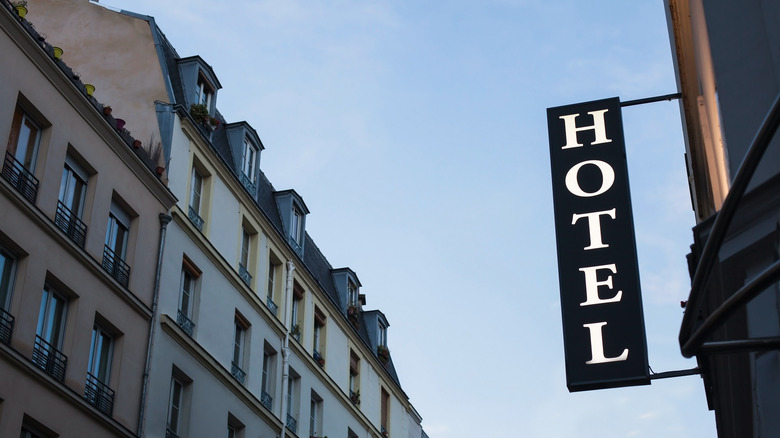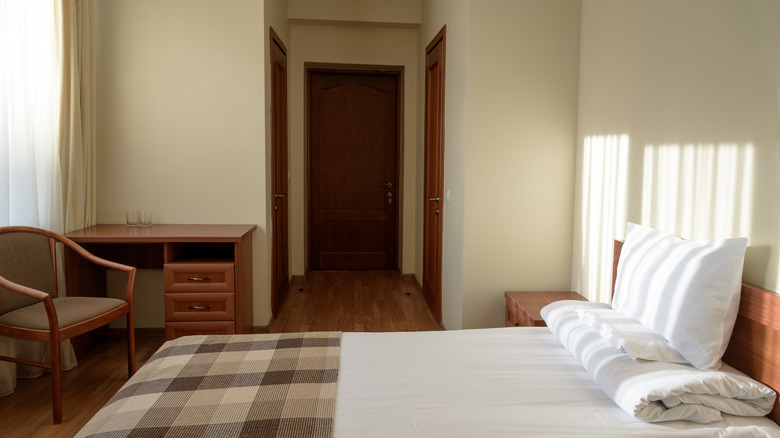Budget Hotels Are Different In Europe. Here's What Rick Steves Says To Expect
Not all of us are lucky enough to stay in fancy hotels with in-house spas, room service, and views of the Colosseum, the Eiffel Tower, or the Sagrada Família. Some of us are budget travelers; let's own it. Traveling through Europe on a budget can be one of the most rewarding ways to experience the continent, and finding the right accommodation at the right price is key to making the most of your trip. Budget hotels in Europe, however, can be a little different from what North American travelers might expect.
According to renowned travel expert Rick Steves, understanding what staying in a European budget hotel entails can help travelers manage their expectations and fully enjoy their stay. He explains that for around $100 per night, a European budget hotel will give you a private room with a simple bed, a chair and a table (whether they're wobbly or not is a gamble), a closet, a window, and maybe a TV. Depending on how "budget" the budget hotel is, you'll either have a private ensuite bathroom or, in the cheapest accommodation, have to share a bathroom and toilet down the hall with other guests.
For many, the idea of sharing a bathroom sounds like a nightmare. However, if it doesn't rub you the wrong way, Steves explains that this is one of the easiest ways to shave off about $20 per night on your accommodation costs. A humble European-style breakfast buffet may or may not be included; if it is, it's likely some combination of cheeses, meats, bread, pastries, yogurts, and perhaps fruits and veggies with an egg. If you don't care much for breakfast, Steves recommends asking for the room rate that excludes breakfast when you book. (In fact, Rick Steves advises against breakfast buffets in general.)
Simple, cheap, funky: European budget hotels
What budget hotels in Europe may lack in luxury, they often make up for with character, uniqueness, and a little funk. Rick Steves paints the picture: "A caged bird in the TV room, grandchildren in the backyard, a dog sleeping in the hall, no uniforms, singing housekeepers, a handwritten neighborhood history lesson on the wall, and different furniture in each room." You might not find 24-hour room service, concierge desks, or daily housekeeping (which you should know how much to tip for). However, the hospitality at these small, budget, family-run hotels is more genuine — think, "first name basis" level of personable.
Moreover, many budget hotels are located in protected, historic buildings with unique architectural features like wooden beams, vintage furniture, and spiral staircases. Do prepare yourself — especially if you're carrying heavy luggage — that there will likely not be an elevator in cities like Paris. Embrace the leg workout as part of the European experience. The decor might feel rustic, mismatched, or even dated (which it often is), but Steves assures that for travelers who are focused on exploring the city rather than lounging in their hotel, this shouldn't be a problem. Some people might actually find it charming.
These types of hotels are becoming an increasingly rare breed as big European cities are becoming more gentrified. However, in southern Europe, particularly Spain, Portugal, and Greece, they're less of an "endangered species." Rick Steves notes that north of the Alps, budget hotels are harder to find and usually cost more than $100 per night. Even though these budget hotels are no frills, if they're good enough for the average European, they might just be good enough for you.

